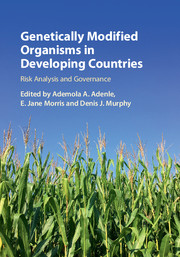Book contents
- Genetically Modified Organisms in Developing CountriesRisk Analysis and Governance
- Genetically Modified Organisms in Developing Countries
- Copyright page
- Contents
- Contributors
- Foreword
- 1 Introduction
- Part I Risk Analysis Methodology and Decision-Making
- Part II Diversification of Expertise
- Part III Risk-Analysis-Based Regulatory Systems
- Part IV Case Studies from Developing Countries
- 18 Risk Regulation of Agricultural GMOs in China: Challenges and Prospects
- 19 Commercial Use and Governance of Bt cotton in China
- 20 The Regulatory Regime for Genetically Modified Crops in India
- 21 The Argentinian GMO Biosafety System: An Evolving Perspective
- 22 The Brazilian GMO Regulatory System: A Historical View and Perspective
- 23 An Effective Regulatory Regime Supported by Research and Development Is Key to Adoption of GM Technology in West Africa: Burkina Faso and Nigeria as Case Studies
- 24 A Pathway for Biosafety Regulation of GMOs in Sub-Saharan Africa
- 25 Conclusions and Recommendations
- Index
- References
18 - Risk Regulation of Agricultural GMOs in China: Challenges and Prospects
from Part IV - Case Studies from Developing Countries
Published online by Cambridge University Press: 05 July 2017
- Genetically Modified Organisms in Developing CountriesRisk Analysis and Governance
- Genetically Modified Organisms in Developing Countries
- Copyright page
- Contents
- Contributors
- Foreword
- 1 Introduction
- Part I Risk Analysis Methodology and Decision-Making
- Part II Diversification of Expertise
- Part III Risk-Analysis-Based Regulatory Systems
- Part IV Case Studies from Developing Countries
- 18 Risk Regulation of Agricultural GMOs in China: Challenges and Prospects
- 19 Commercial Use and Governance of Bt cotton in China
- 20 The Regulatory Regime for Genetically Modified Crops in India
- 21 The Argentinian GMO Biosafety System: An Evolving Perspective
- 22 The Brazilian GMO Regulatory System: A Historical View and Perspective
- 23 An Effective Regulatory Regime Supported by Research and Development Is Key to Adoption of GM Technology in West Africa: Burkina Faso and Nigeria as Case Studies
- 24 A Pathway for Biosafety Regulation of GMOs in Sub-Saharan Africa
- 25 Conclusions and Recommendations
- Index
- References
Summary
- Type
- Chapter
- Information
- Genetically Modified Organisms in Developing CountriesRisk Analysis and Governance, pp. 215 - 224Publisher: Cambridge University PressPrint publication year: 2017

